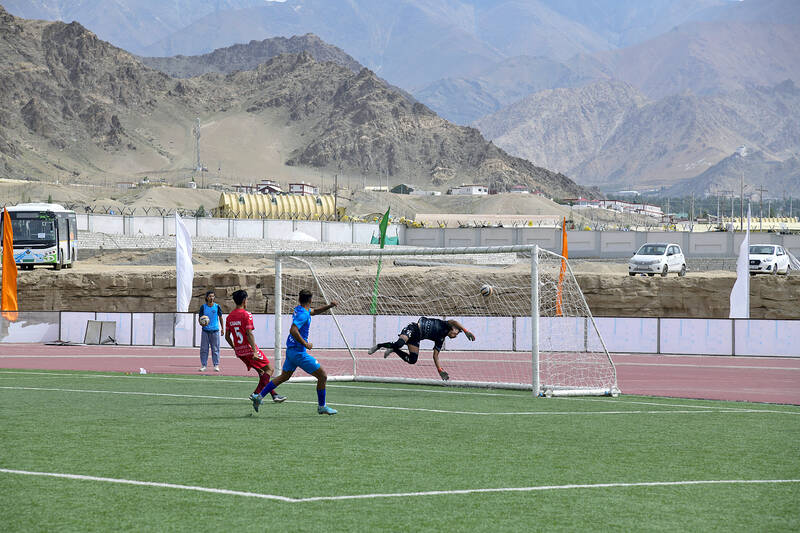The players dribble and run like in any other soccer game, but within a minute or two, some stop to huff and puff, before pushing themselves on in an unusual challenge high in India’s remote and mountainous desert region of Ladakh.
It is the first of its kind “climate-friendly” soccer tournament in the ecologically fragile territory where oxygen is thin and breathing is hard. When the wind picks up, usually in the afternoons, it brings sand and dust that cover the high-altitude stadium’s synthetic turf.
The organizers say the ongoing “climate cup” in Leh is the first in Asia held at an altitude of more than 3,350m and with a minimum carbon footprint. Four teams are participating in the matches, held on alternate days.

Photo: AP
Before the tournament, the players took at least two days to acclimatize to the altitude.
Still, they cannot play with the same intensity as on lower altitudes, organizers said.
In Leh, only a handful of posters and banners promote the matches. The organizers have relied heavily on social media to popularize the games, which are also streamed live on YouTube.
Electric buses are used to take players to and from the matches, and all plastic is prohibited at the stadium. Players have been given multiuse aluminum sippers. Water is from a local spring and dispensers have been placed on dugouts.
The tournament is “our attempt to use sports for spreading awareness about the perils of climate change in Ladakh,” local administrator Tashi Gyalson said.
Spectators have been encouraged to bring in their own nonplastic water bottles. No chips or soft drinks are provided and the players are served only traditional, organic Ladakhi food and locally grown fruit.
“Using a climate-friendly soccer tournament is a humble beginning. We are determined to fight climate change [in Ladakh] at multiple levels,” Gyalson said.
Nestled between India, Pakistan and China, the region is known for its inhospitable yet pristine highland passes and vast river valleys. In the past, it was an important part of the Silk Road trade route.
In more recent times, Ladakh has faced territorial disputes and the stark effects of climate change. Its sparsely populated villages have been hit by shifting weather patterns that have altered people’s lives through floods, landslides, droughts and migrations.
Ladakh’s thousands of glaciers, which helped dub the rugged region one of the “water towers of the world,” are receding at an alarming rate, threatening the water supply of millions of people.
The melting has been exacerbated by an increase in local pollution that has worsened due to the region’s militarization, further intensified by a military standoff between India and China since 2020.
With 300-plus days of sunshine a year, Ladakh gets only about 100mm of rainfall annually, mainly in winter. In July, the number soared to 42.8mm of rainfall in just one month — the highest in three decades.
“Recent trends are showing clear changes in climate patterns,” India Meteorological Department meteorologist Mukhtar Ahmed said.
Local officials say the soccer matches were organized keeping in mind some of these climate concerns.
“The entire DNA of the tournament is very organic,” said Shamim Meraj, who advised the local administration on organizing the tournament.
“You are thirsty, you go to the dispenser and refill your bottle, or drink like a schoolboy from the tap,” he said. “You are hungry, you go grab some fruit.”

Manchester United on Tuesday confirmed Michael Carrick as interim manager until the end of the season, tasking him with leading the Red Devils back into the UEFA Champions League. “Having the responsibility to lead Manchester United is an honor,” said Carrick, 44, who won 12 major trophies in his 12-year playing career at United. The former midfielder previously had an unbeaten three-game stint as caretaker boss at Old Trafford in 2021. Carrick then took on his first permanent managerial role at second-tier Middlesbrough in October 2022 and was sacked in June last year after the club finished 10th in the

MARRED FINAL: As most of Senegalese players walked off the pitch after a controversial decision, some supporters threw objects and attempted to get onto the pitch Senegal on Sunday won the Africa Cup of Nations (AFCON) as Pape Gueye’s extra-time winner sunk hosts Morocco 1-0 after a chaotic final that saw the eventual champions storm off the pitch late in the game. Brahim Diaz could have won the trophy for Morocco with a controversial spot-kick in the 24th minute of added time at the end of normal time as ugly scenes broke out in the stands. However, Senegal goalkeeper Edouard Mendy easily saved the weak attempted “Panenka” chip by the Real Madrid winger, who was clearly distracted by the long delay that followed the penalty award.

James Harden on Friday scored 31 points and came up big in overtime to help the Los Angeles Clippers erase a double-digit deficit on the way to a 121-117 NBA victory over the Toronto Raptors. Harden scored 16 points in the fourth quarter and overtime as the Clippers pushed their wining steak to five games despite the absence of star Kawhi Leonard with a sprained right ankle. The Clippers trailed by 11 entering the fourth quarter, but Harden drilled a pair of free-throws with 1:24 left in regulation to tie it and after misses from both teams, they went to

Dallas Mavericks rookie Cooper Flagg on Wednesday was ruled out for the second half of their 118-109 loss to the Denver Nuggets after the No. 1 pick sprained his left ankle in the first half. Flagg was called for a foul while defending against Peyton Watson and turned the ankle as he fell to the floor with 6 minutes, 1 second left in the second quarter. Flagg limped to the bench and continued to the locker room, but returned for the final 2 minutes, 35 seconds before the break. The 19-year-old did not come out for the second half before the announcement that